|
«Scoring The Magnificent Seven from James Horner’s themes has been a labour of love» After working with James Horner for almost two decades, Simon Franglen talks about his posthumous work, The Magnificent Seven, which was commissioned to complete. Hi Simon, first of all, thank you so much for talking with BSOSpirit about your work on The Magnificent Seven. We would love to know which were the themes James created at first just by reading the screenplay and how did you develop them to structure the final score with your collaborators?
The moving presence of so many James’ musical trademarks (the Shakuhachi bursts, the ethnic tones, the presence of the so called “danger motif”, …) are truly gorgeous to discover through the score. How did you decide the approach speaking orchestrationally, to give life to James’ themes and your themes symphonically?
Was the using of some kind of banjo for the villain a decision made at the beginning of the compositional process?, because it is extremely brilliant how subliminally it defines the evil so intelligently. I spent a week trying to get the right theme and feel for the villain. I had been trying clay pots and any number of other instruments to get the right vibe for the rhythmic ostinato when I picked up a banjo. It immediately felt right, it is unsophisticated and edgy, when combined with the string line I hope it makes you feel uneasy. Was the female lyrical voice performing one of the themes in such an emotional crescendo in “House of Judgment” one of the most rewarding moments at the recording sessions?, surely for the listener is a “goosebumps” classic instant of this score. I had arranged the theme for voice in one of the original demo recordings, it felt right for the that moment. Emma Cullen’s role in the film as the female lead is extremely important, she is the reason the seven come together, but I wanted to remind people that she has lost so much as well. At the climax of the film we discover the theme for The Magnificent Seven (so intelligently just hinted through the first part of the score) finally reaching its payoff and full powerful bravado in “Faraday’s Ride” and “The Darkest Hour”, reaching here the most gloriously epic moment of greatness, was this idea of not giving it fully before, to structure the score, suggested by James, or your decision?, and how did you structure the cue to reach so many high points so magnificently?
The evolution of the themes within the score was very much driven by Antoine’s vision of how the music should grow in the film. We did try using the big themes much earlier, for instance I tried it during the first gunfight, however the final version of that “Seven Angels of Vengeance” felt so much more appropriate for the emotion there – these men are dangerous. The “Seven Riders” cue fulfills the story of the film and score giving completion and closing the thematic circle with a final rendition to the Main Themes in epic fashion, how did you decide to combine these musical elements to create this track? (with the mythic sense of the original Bernstein theme in the percussion no less)
Indeed, it worked wonderfully big time. Finally, if it is possible, we would love to have a few words from you about how was to work with Mr. Horner through the years from your perspective, specially creating the musical world of The Magnificent Seven. James was one of my musical heroes, he was one of my best friends. Scoring The Magnificent Seven from his themes has been a labour of love. I and the team are proud that we were able to deliver this score for him. Thank you so much Mr. Franglen for sharing your thoughts with us, it has been truly an honor. My Pleasure. |
Author
BIO: Simon Franglen has worked for decades as an arranger, programmer and producer with many of Hollywood’s leading composers including John Barry, Howard Shore, Thomas Newman, Alan Silvestri and most notably James Horner, with whom he worked for nearly twenty years. He received a Grammy Award for Record of the Year for his production of the smash hit “My Heart Will Go On” from James Cameron’s ‘Titanic’, and received Golden Globe, Grammy Award and World Soundtrack Award nominations for co-writing and producing the theme song “I See You” from Cameron’s Avatar. He co-composed the score for director Antoine Fuqua’s The Magnificent Seven, which he completed following the tragic death of his long-time colleague and friend, composer James Horner.
|



 Hi, yes, no problem. James wrote several themes based on his feelings about the script. A theme for the town, a darker variation for danger, a more heroic version for the heroes and so on. James had talked to Simon Rhodes and I about his thoughts on the score. We took these, arranged them and made an orchestral suite. I hired an orchestra and studio to record this; this suite was what I took to play to Antoine Fuqua.
Hi, yes, no problem. James wrote several themes based on his feelings about the script. A theme for the town, a darker variation for danger, a more heroic version for the heroes and so on. James had talked to Simon Rhodes and I about his thoughts on the score. We took these, arranged them and made an orchestral suite. I hired an orchestra and studio to record this; this suite was what I took to play to Antoine Fuqua.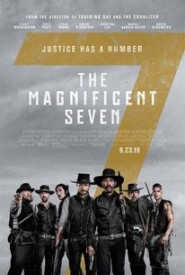 Many of the colours were defined by Antoine’s love of Thunderheart and Legends of the Fall. In terms of the orchestration, it had to sound like a classic western but I also knew that it had to have a muscular feel to it, Antoine’s movie was much more edgy and violent in terms of its action than the original movie. The score needed to reflect that.
Many of the colours were defined by Antoine’s love of Thunderheart and Legends of the Fall. In terms of the orchestration, it had to sound like a classic western but I also knew that it had to have a muscular feel to it, Antoine’s movie was much more edgy and violent in terms of its action than the original movie. The score needed to reflect that.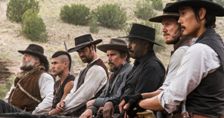 I wrote the final action sequence as about eighteen minutes of connected cues to play as a single unified piece with the ebbs and flows of the action. As you can tell from the film, there are many high and low moments and my job was to reflect the emotional rollercoaster within the film as the final battle evolves while keeping the action moving. We split these up on the CD by the way, “Faraday’s Ride” and “The Darkest Hour” were written and played as a single 7’30” cue.
I wrote the final action sequence as about eighteen minutes of connected cues to play as a single unified piece with the ebbs and flows of the action. As you can tell from the film, there are many high and low moments and my job was to reflect the emotional rollercoaster within the film as the final battle evolves while keeping the action moving. We split these up on the CD by the way, “Faraday’s Ride” and “The Darkest Hour” were written and played as a single 7’30” cue.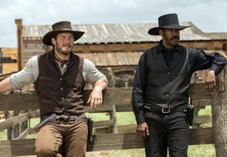 You are coming to the end of the movie, I wanted to find a way of combining all the main themes and emotions within the score into one final cue. We have been through some very dramatic moments and as we look at Chisolm, the villagers around him, who have also fought for their town, gradually realize that they have won. I wanted to play the emotion of the resurrection of the town and their victory as well as the remembrance of the fallen heroes. I needed also to pave the way for the Elmer Bernstein theme to come, I hope this works.
You are coming to the end of the movie, I wanted to find a way of combining all the main themes and emotions within the score into one final cue. We have been through some very dramatic moments and as we look at Chisolm, the villagers around him, who have also fought for their town, gradually realize that they have won. I wanted to play the emotion of the resurrection of the town and their victory as well as the remembrance of the fallen heroes. I needed also to pave the way for the Elmer Bernstein theme to come, I hope this works.

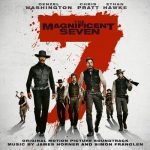

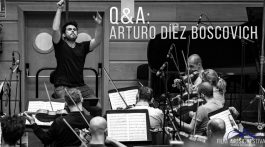
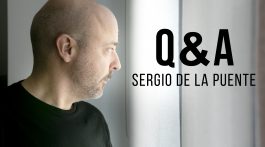
No hay comentarios